The sight of 109 baby strollers abandoned in the central square of the Ukrainian city of Lviv in March, 2022, left a lasting impression on Shyu Ruey-shiann (徐瑞憲), inspiring him to create Between II (之間II), a large-scale installation currently on view at the Taipei Fine Arts Museum (TFAM).
Each stroller activates a sound, be it a shell exploding, the cries of child or the voice of someone afflicted by the conflict in Ukraine telling their story.
Shyu’s work is among four exhibits on the museum’s third floor, which run until Oct. 20. Although the range of approaches are very different, themes of identity and belonging pervade the exhibit halls.
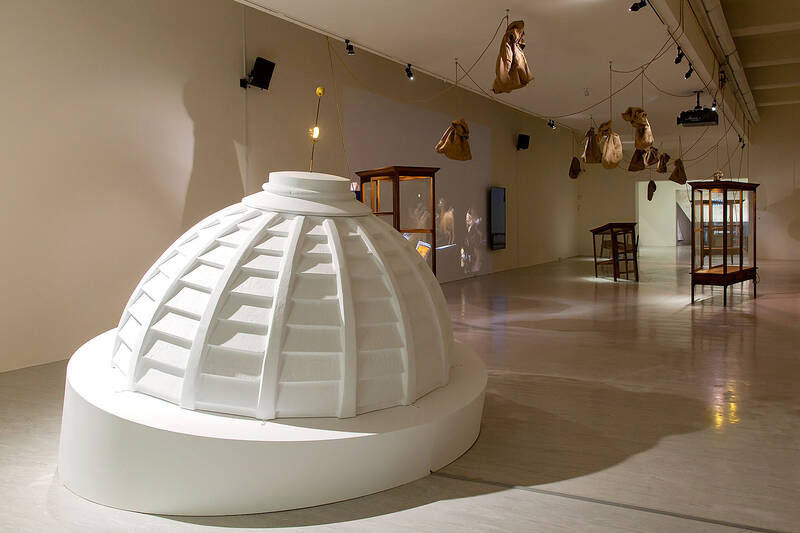
Photo courtesy of TFAM
SOLIDARITY WITH UKRAINE
Although Between II is somewhat bewildering at first glance — a gallery space filled with baby strollers — once you push one of the strollers, the artist’s message becomes apparent.
Shyu combines the field recordings he made in Ukraine with wall graffiti written by Ukrainians describing the Russian invasion that has destroyed much of their country.
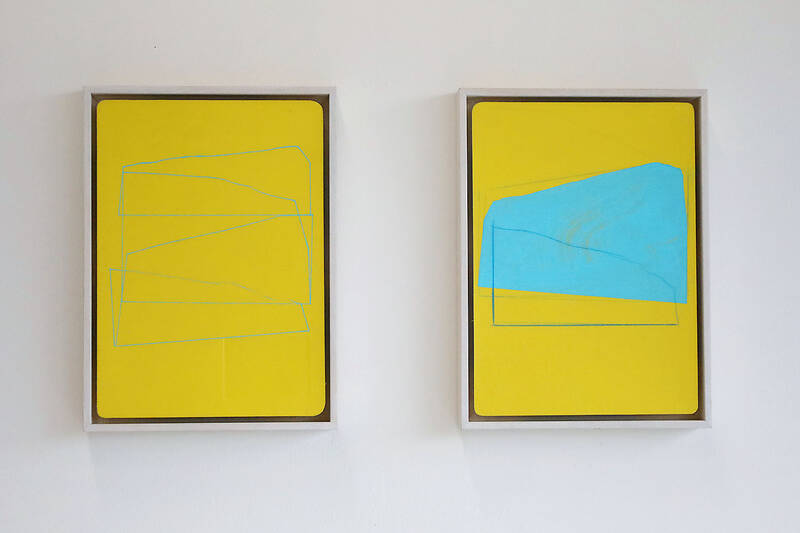
Photo: Thomas Bird, Taipei Times
One line expresses the hopelessness they feel: “Sometimes you just get used to sirens,” it reads.
Despite creating a deeply symbolic installation, it doesn’t get more real than this.
LINES IN THE SAND
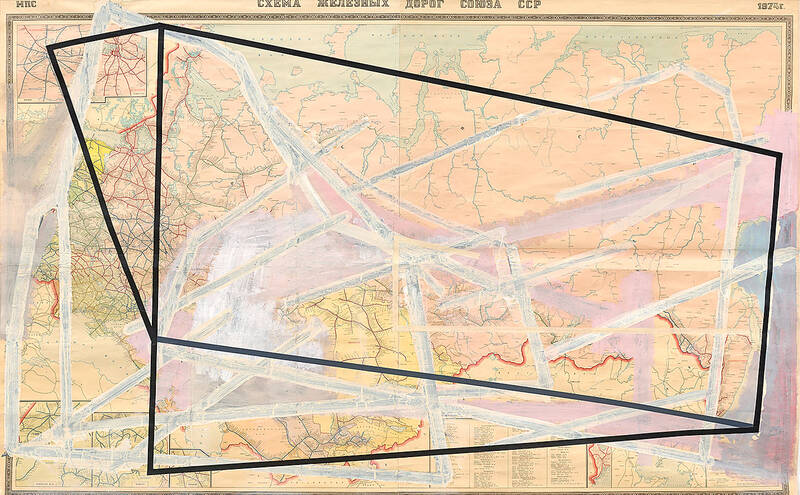
Photo courtesy of TFAM
Taipei-born, Germany-based Chen I-shu’s (陳以書) exhibit Fake Landscapes (假山水) also includes references to the war in Ukraine.
Chen asserts that as a Taiwanese artist, he must confront his identity, not only artistically or culturally but also politically and historically.
This concern inevitably draws parallels with the Ukrainian experience.
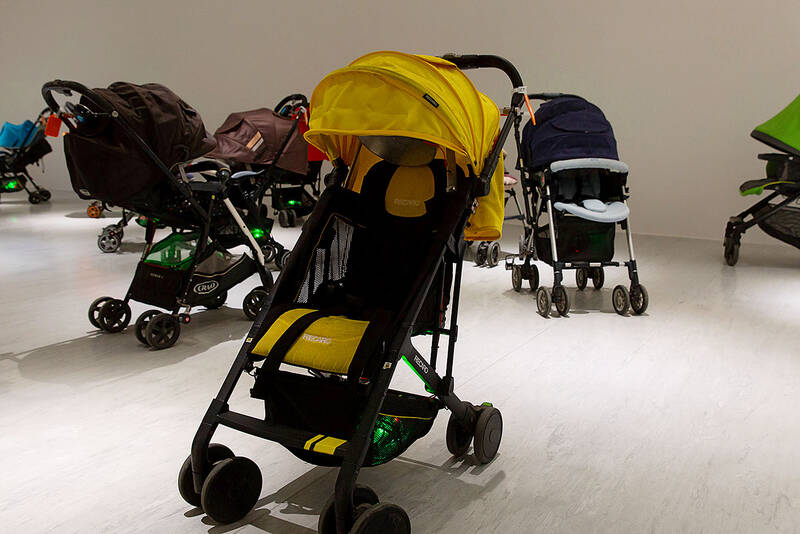
Photo courtesy of TFAM
The result is Hommage a Ukraine (向烏克蘭致敬) — six works that distort and subvert the color scheme of the Ukraine flag.
Opposite, Chen redraws the map of Russia by painting lines and sticking tape on an old map of the USSR in a work he’s titled Divided Empire (分裂的帝國).
These are potent creations, which, like the work of Shyu, have special resonance for Taiwanese visitors to the museum.
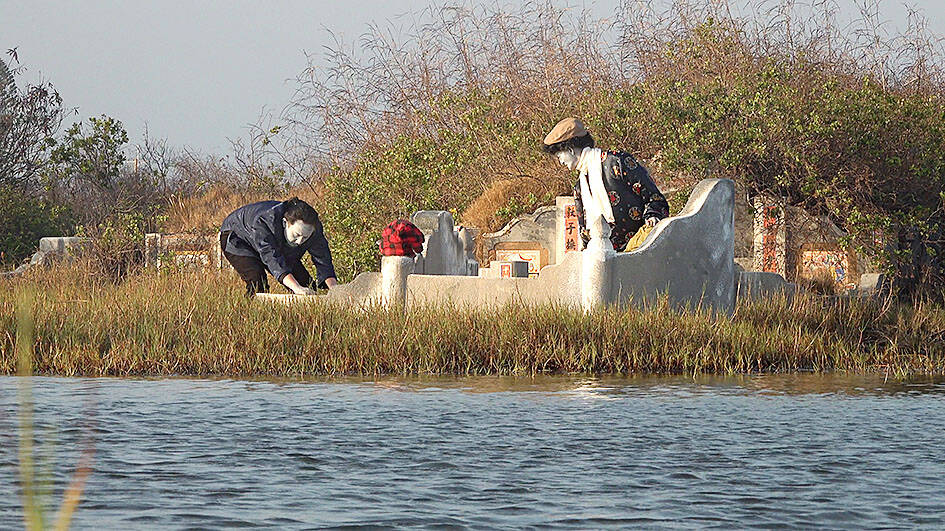
Photo courtesy of TFAM
However, the rest of his exhibit is dominated by large Untitled impressionist works that lack the same urgency.
These pieces are “based on the compositions of stacked rocks” and “the cross-section lines suggests the concept of real and unreal in limbo,” reads the exhibit’s introduction.
Well maybe. But the subversion of classical landscape painting has been done by more than few of Chen’s contemporaries, while he doesn’t hide the influences of twentieth-century masters (see Rothko, de Kooning or even Lichtenstein) who explored similar terrain.
OF ANIMALS AND MAN
The most unusual of the solo exhibits is by Chiayi-born Tsai Pou-ching (蔡咅璟).
Tsai has been fond of animals since childhood and his recent work “attends to human-animal relationships through his study of amateur biology.”
Specimen of Empire (帝國的標本) exhibits old images collected by the Japanese authorities who had sought to document and categorize the native fauna of its Asian colonies for The Empire of Japan Museum, a museum that never came to fruition.
Tsai resurrects their faded images and taxidermy that were abandoned at the end of World War II in order to create art from something that had hitherto belonged to science, history and empire.
By incorporating video and installation, Tsai makes these lost zoological dreams three-dimensional.
The artwork is visually arresting and somewhat haunting, as one regards animals, not in the light of scientific documentation, but in the shadows of modern history and the amnesia that accompanies regime change.
However, Tsai’s stated aim of exploring “contemporary survival modes and progressively complex relationships with animals,” is a tad intellectually lofty and, frankly, vague.
GETTING OLD
Ni Hsiang (倪祥), another Chiayi-born artist, investigates Taiwan’s super-aging society with Everyone came to see you (大家都來看你了).
This radical, if rather idiosyncratic exhibit, takes two walk-throughs to make sense of, even though the topic is a pressing one.
By assembling belongings from the past — including kitschy memorabilia, familiar heirlooms, relics from pre-democratic Taiwan and trash — Ni creates sculptures of people’s lives out of the material culture they have left behind.
There’s a satirical-comic element to the artwork — walking-frames paired with bicycle helmets that gallery visitors are invited to use; a range of soaps leading to an empty shower; a video beamed onto some fruit boxes of a ghostly person canoeing a grave-shaped boat down a stream amidst hundreds of ancestral graves.
All express the burden of history felt by young Taiwanese tasked with supporting many old people.
Unfortunately, like Specimen of Empire this exhibit is a tad too clever for its own good and suffers from an excess of materials and media.
While ideas are plentiful, a minimalist and clear-eyed approach would make these good exhibits great.

Climate change, political headwinds and diverging market dynamics around the world have pushed coffee prices to fresh records, jacking up the cost of your everyday brew or a barista’s signature macchiato. While the current hot streak may calm down in the coming months, experts and industry insiders expect volatility will remain the watchword, giving little visibility for producers — two-thirds of whom farm parcels of less than one hectare. METEORIC RISE The price of arabica beans listed in New York surged by 90 percent last year, smashing on Dec. 10 a record dating from 1977 — US$3.48 per pound. Robusta prices have

A few years ago, getting a visa to visit China was a “ball ache,” says Kate Murray. The Australian was going for a four-day trade show, but the visa required a formal invitation from the organizers and what felt like “a thousand forms.” “They wanted so many details about your life and personal life,” she tells the Guardian. “The paperwork was bonkers.” But were she to go back again now, Murray could just jump on the plane. Australians are among citizens of almost 40 countries for which China now waives visas for business, tourism or family visits for up to four weeks. It’s

The resignation of Taiwan People’s Party (TPP) co-founder Ko Wen-je (柯文哲) as party chair on Jan. 1 has led to an interesting battle between two leading party figures, Huang Kuo-chang (黃國昌) and Tsai Pi-ru (蔡壁如). For years the party has been a one-man show, but with Ko being held incommunicado while on trial for corruption, the new chair’s leadership could be make or break for the young party. Not only are the two very different in style, their backgrounds are very different. Tsai is a co-founder of the TPP and has been with Ko from the very beginning. Huang has

Beyonce on Sunday finally won the Grammy for the year’s best album for her culture-shaking Cowboy Carter, as rapper Kendrick Lamar posted a clean sweep on a night that served as a love letter to fire-ravaged Los Angeles. Chappell Roan, Charli XCX, Doechii and Sabrina Carpenter emerged as big winners at the performance-heavy gala, while heavyweights Taylor Swift and Billie Eilish went home empty-handed. Beyonce’s win for Cowboy Carter now makes her the most nominated, most decorated artist at the awards show ever — as well as the first Black woman to claim the top prize in this century. The triumph was all